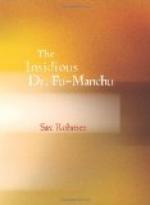Yet Smith was not satisfied. Neither, let me confess, was I. Every port was watched; and in suspected districts a kind of house-to-house patrol had been instituted. Unknown to the great public, in those days a secret war waged— a war in which all the available forces of the authorities took the field against one man! But that one man was the evil of the East incarnate.
When we rejoined him, Nayland Smith was talking to the commissionaire at the door. He turned to me.
“That is Professor Jenner Monde,” he said. “The sergeant, here, knows him well.”
The name of the celebrated Orientalist of course was familiar to me, although I had never before set eyes upon him.
“The Professor was out East the last time I was there, sir,” stated the commissionaire. “I often used to see him. But he’s an eccentric old gentleman. Seems to live in a world of his own. He’s recently back from China, I think.”
Nayland Smith stood clicking his teeth together in irritable hesitation. I heard Karamaneh sigh, and, looking at her, I saw that her cheeks were regaining their natural color.
She smiled in pathetic apology.
“If he was here he is gone,” she said. “I am not afraid now.”
Smith thanked the commissionaire for his information and we quitted the gallery.
“Professor Jenner Monde,” muttered my friend, “has lived so long in China as almost to be a Chinaman. I have never met him— never seen him, before; but I wonder—”
“You wonder what, Smith?”
“I wonder if he could possibly be an ally, of the Doctor’s!”
I stared at him in amazement.
“If we are to attach any importance to the incident at all,” I said, “we must remember that the boy’s impression—and Karamaneh’s— was that Fu-Manchu was present in person.”
“I do attach importance to the incident, Petrie; they are naturally sensitive to such impressions. But I doubt if even the abnormal organization of Aziz could distinguish between the hidden presence of a creature of the Doctor’s and that of the Doctor himself. I shall make a point of calling upon Professor Jenner Monde.”
But Fate had ordained that much should happen ere Smith made his proposed call upon the Professor.
Karamaneh and her brother safely lodged in their hotel (which was watched night and day by four men under Smith’s orders), we returned to my quiet suburban rooms.
“First,” said Smith, “let us see what we can find out respecting Professor Monde.”
He went to the telephone and called up New Scotland Yard. There followed some little delay before the requisite information was obtained. Finally, however, we learned that the Professor was something of a recluse, having few acquaintances, and fewer friends.
He lived alone in chambers in New Inn Court, Carey Street. A charwoman did such cleaning as was considered necessary by the Professor, who employed no regular domestic. When he was in London he might be seen fairly frequently at the British Museum, where his shabby figure was familiar to the officials. When he was not in London—that is, during the greater part of each year—no one knew where he went. He never left any address to which letters might be forwarded.




